Perfect Music Hated
“The Goldbergs are a desert of happiness with oases of sadness: we drink thirstily at all-too-rare darkness. People often say their favorite variation is number 25, the last minor variation, the darkest, the so-called ‘black pearl.’ But number 25 is a pretty serious exception. What they’re saying is that their favorite part of the piece is the part that’s not really like the piece.”
— It is “Goldberg Week” over at NPR, and pianist Jeremy Denk calls them “the Martha Stewart of Variations.” [Related]
To Nowhere Island! In The Middle Of The Sea
To Nowhere Island! In The Middle Of The Sea
by Sara Morrison

My dream vacation spot is an island in the middle of the Atlantic Ocean. It’s a British territory, which may have you picturing Bermuda, the Caymans or maybe Turks and Caicos. Somewhere tropical and gorgeous, surely, because that’s what island vacations are for: lying on the beach, basking in the sun, and watching other tourists fail at parasailing. But this island is not tropical and gorgeous. In fact, the skies are usually grey. There are no beaches, no parasailing, and barely any tourists to fail at it if there was. It’s called Tristan da Cunha, and it’s the most isolated inhabited place in the world. This is where I want to go, and I probably never will.
The island is roughly equidistant between South America and Africa. Its closest inhabited neighbor (1,320 miles away — about half the width of the United States) is Saint Helena, best known as the island Napoleon Bonaparte was exiled to because it was far enough away from everything else to prevent him from escaping or being rescued. Compared to Tristan’s location, Bonaparte’s final home hardly feels remote at all.
Yet 261 British citizens proudly call it their home today (it was 262 until the death of 81-year-old Lydia Green on February 8th, may she rest in peace). It’s an insular community, to say the least: they share just eight last names among them. The island is roughly 40 square miles in area, most of which is volcano. Where the volcano meets the sea, the land flattens out, leaving space for one village (Edinburgh of the Seven Seas — called “The Settlement” locally) and some farmland.
There’s no airport and no harbor either — not since the lava flow from a volcanic eruption in 1961 destroyed it. Tristan’s only accessible through a port, which is used by fishing vessels and boats that ferry back and forth to the few large ships that pass by the island every year, delivering supplies and mail. Sometimes they also bring people.
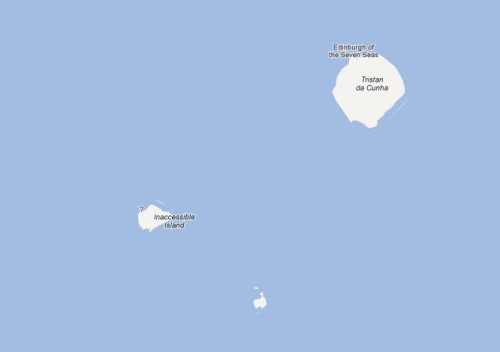
The chance that I will ever be one of those people is pretty slim. It’s a 1,750-mile voyage from Cape Town that takes at least six days each way and isn’t cheap. When the ship finally arrives in Tristan’s waters, there’s no guarantee the water will be calm enough to take a smaller boat to the island. There’s also no guarantee I’d be allowed on it. Special permission must be obtained from the 11-member Island Council, who require a background check and proof of health insurance.
I should be able to pass those tests, but then they’d want to know the reason for my visit. This presents a problem, as I don’t really have an answer. The island isn’t particularly beautiful, the weather isn’t especially nice, and, aside from studying the island’s native Northern Rockhopper penguin population (in which I have little interest despite their bold spiky feather hairdos), there doesn’t appear to be much to do there.
They do have telephones, television and the Internet, which has been especially useful for my research. Tina Glass answers emails sent to Tristan’s “general enquiries” address on its official website. She writes that most of the islanders are employed by the government or the fish factory, and they spend their non-work hours tending to livestock and communally-owned potato plots. The island has a school, a post office, a museum, a coffee shop, two churches (one Catholic, one Anglican), a supermarket, and a tourism center that can’t possibly be very busy. A health facility provides free care to residents, many of whom suffer from the same genetic diseases the incestuous nature of a remote island and a small population breeds. There’s Prince Phillip Hall, home to the Albatross Bar and the “social heart of the village,” according to the website. All told, I think these places could keep me busy for three hours, maximum. Maybe another five hours if the Albatross Bar is well stocked.

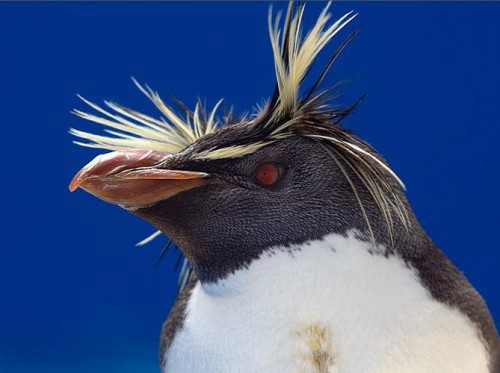
I think what fascinates me, then, is the people of Tristan, not the island itself. What must it be like to spend your whole life in the same place with the same people, surrounded by thousands of miles of uninterrupted, unforgiving ocean? Since 1816, when William Glass arrived on the island with his wife and children, this community has steadily developed its own culture and dialect. Some residents have never left the island: What must those people be like? What do they sound like? What do they think of us? What do they do on the weekends? What do they wear? Who cuts their hair? It’s probably just one person who can’t have been trained properly. I bet they all have bad hair, just like those Northern Rockhopper penguins. What could we possibly have to talk about? Some of them have never seen a stoplight, or tasted McDonald’s, or stepped inside a building more than two stories high.
Tina Glass has. She’s been to South Africa and France, and lived in the United Kingdom for a year. She comes across as perfectly (and, I must admit, somewhat disappointingly) normal in her emails, writing “I found it all fascinating and very different from our environment.” As different from me as these people may seem, at least one of them views my world the same way I view hers.
“On the island we have no crime and do not have to lock doors. We are a small community and where everyone knows each other,” Glass writes. I come from a small town in Connecticut that sounds very similar and often felt just as remote. I hated it and couldn’t wait to leave. And yet I’d be willing to endure weeks of travel and spend thousands of dollars to go to a community that is even smaller and weirder… in the middle of the ocean, next to nowhere.
Sara Morrison once lived in Los Angeles and played roller derby. Now she goes to graduate school in New York and thinks about roller derby. Top two photos by Michael Clarke; penguin photo by su neko.
Stray Monkey Briefly Alleviates Crushing Boredom Of Life In Pennsylvania
It is against the law to keep monkeys as pets in Pennsylvania. Now you know!
Is Your iPhone Making You Fat?

“Gender-bending chemicals in mobile phones, toys and sunglasses may be fuelling the obesity epidemic, a report warns today. The chemicals — which are unavoidable in the modern world — may also help trigger diabetes, the review of hundreds of individual pieces of research concluded. Some are found in mobile phone cases and tin cans, others in shampoos and shower curtains.”
"Hecuba": From Miles Klee's "Ivyland"
“Hecuba”: From Miles Klee’s “Ivyland”
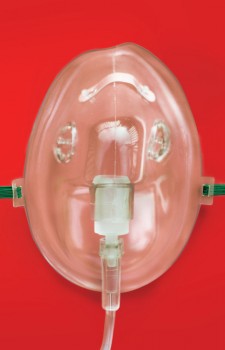
Miles Klee’s debut novel, Ivyland, takes place in a crumbling, violent, post-urban New Jersey. Published by OR Books, the novel’s been getting praise for its dark vision of a burned-out world where drug companies rule, nature is reclaiming what it can, and locals like Hecuba — the bus driver in this excerpt — can only look on in weary disbelief as the past disappears.
One hangover-blasted Wednesday, Hecuba dreamt she was asleep at the wheel, lead-foot subconscious running her route. Eventually she admitted to herself this was no dream and hooked an instinctual right to avoid entering at 60 mph a drive-through ATM tube that would’ve shaved the top off her jitney. Squealing onto Maple Ave, a treeless one-way street, she bore down on an SUV headed in the opposite direction, swerved, popped her last hubcap off into spinning shine on the air as a pothole’s grace note flickered underneath, and sneezed.
It was a bus of the undead she piloted, seniors being the only passengers with a life expectancy not drastically shortened by her driving, and she circled the urban prairie of Ivyland four times daily, like a clump of hair that flirts with the shower drain. Courseless though she seemed, Hecuba did have a navigational approach: she drove toward the colorful, trying to outpace unsaturated hues that pervaded Jersey’s suburbscape to the point of conspiracy, this dumbly guillotine-blade sky. Her cargo didn’t care, content simply to stay in motion.
“Pardon me, miss, but the rec center is in the other direction,” one zombie had the gall to pipe up. “Worked there, actually. Thirty-two years. There when they put in the new wing, supervised it. My grandkid — little angel — she’s got a piano recital, and since it’s the next stop, and normally you never stop there, not that I’m criticizing — ”
“Shut up now, please,” Hecuba said when she could take no more. She puked discreetly enough out her window, tried to blame Tequila Tuesday. Lenny Marx, who owned Viking Putt MiniGolf on Route 22 and kicked his dog as though he needed a creature to pity, never failed to goad her into it. Tequila Tuesday at Sipwell’s was his Sabbath, his booth a shrine. Afterwards, they’d usually screw. But Hecuba hadn’t held out hope on that front a few Tuesdays back when Lenny’d won two hundo on a scratch ticket and vowed to drink it. He’d fade into brainless neon fuzz, reemerging with a smile and twin shot glasses of amber venom. At last call he’d rushed the bar while Hecuba coasted on a perfect fog.
The glitchy jukebox played some albums too loud, and Lenny had memorized which, so when a Celine Dion single suddenly cut the din, Hecuba’s suspect list was one name long. Lenny, across the room, held a handsome leer up to frail light.
“What faggot put this on?” this grease stain missing an eyebrow roared. Lenny jabbed a thumb at the backs of two planetoids disguised as Collars. You were my voice when I couldn’t speak, Celine oozed.
“You,” eyebrow yelled at the neckless duo, who turned away from a South Jerz girl they’d been feeding umbrella drinks. One pointed at both his platinum blonde sideburns, like: me?
“Yeah, you. Are a fucking. Faggot.”
Flesh hit flesh, toppled tables broke glass. Lenny settled next to Hecuba as the carnage erupted, scratching her shoulder with his stubble.
The jukebox yowled, I’m everything I am.
“Not that you needed a reason,” she began.
“Jumped me in line. Manners are all we’ve got.” He drowned his grin in beer as a guy who’d been tossed once already that night sprayed the brawlers with a fire extinguisher, filling the bar with a nasty white smog. Hecuba threw back her head and laughed so hard that a Sipwell’s lifer dozing in the next booth, eyes still closed, asked if she was gonna be okay.
Recalling the bloody tooth that splashed in Lenny’s mug shortly after, she laughed again, meaning to suffocate on arrival the uninvited image: opened pink-and-white box. On her toilet, days after the fact. Leering the pretty way Lenny did.
Ivyland was smug as she blew through its crowded vacancies, past gutted beauty parlors; the offices of injury lawyers Oppenheimer & Glove, which used to be a car dealership run by local ad loony Unami “Uzi” Cloudfoot, and with its dorsal-finned red roof seemed an overturned sailboat; strip malls offering party favors in bulk and used vacuums, while brass-knuckled guys sold powerful Adderade cocktails in forever damp back lots. The scenery singing you got a little too used to this. Remembering to take a shortcut, she cursed — did adapting to a swamp mean you were unfit to leave? She knew the wonky light on Fairfield stayed red for six and a half suicidal minutes, that the dead-ending maze of McMansions up past Floods Hill was so like those assholes’ sense of humor, and that JFK Junior High let out at exactly 3:13, would-be gangstas and goths, seeds that might never break the surface, tumbling out in knee-length white T-shirts and clip-on nose rings and re-stitched backpacks. Kids she used to bus to school, who threw crap at her jitney when she slowed down to see if any might recognize her.
She had two children of her own — adults, technically — the elder a daughter who’d eloped with a geneticist given to dressing like Elvis. He actually dreamed of cloning the man, wore a ring set with his synthetically duplicated DNA, was once sued by the licensing company that owned The King’s image, had been rebuked at Graceland countless times for you-don’t-want-to-know what kind of reconnaissance, and hoped to snag the bio-copyrights to some less untouchable celebrities, probably a comedian. Hecuba identified parts of the obsession both pathetic and charming.
The son, DH, had been living under her roof for twenty-eight consecutive years, discounting a short window of foster care and various weeklong benders that stranded him in Atlantic City jails, the Filthydelphia sprawl, and once even the Pine Barrens (sand from the Jersey Dunes collected in the corner of each eye), rarely with an inkling of how he’d arrived. Hecuba pictured him sleepwalking up and down the Turnpike for days at a stretch. Lenny casually sparked these episodes with a game of crass allusion to the long-disappeared father, who’d worked a job in South Woodbane’s septic quarter apparently too humiliating to describe. Lenny was given to claiming that anyone with a son like this would be a fool not to ditch, whether they came home smelling like shit or no. Then a wink at Hecuba. DH, by contrast, was committed to a fantasy he’d perfected out after seeing a special report in sixth grade: poisoning by tainted spinach. A senseless tragedy. No one’s fault.
DH’s boggling and childish insistence on this point unnerved Lenny, who occasionally feared karmic payback for the hazing, and what would be more poetic than death by toxic vegetable? Any gut-ache was cause for alarm, and as he woke on Wednesday, one pale shade of consciousness dissolving into the next, gut was where the first ache bloomed. He recognized the mangy green of Viking Putt’s sixteenth hole, the mead-toting valkyrie statue, both of which reinforced the worry. What’d he eaten? That suspicious gyro. What’d he drunk?
Lenny rolled onto his back and stared at the underside of Nidhogg, an apocalyptic beast set free from the Underworld, jagged head raised in a mute roar of celebration. Or maybe pain: a child-size golf club dangled from the dragon’s eye, jammed in a hole where it’d been used to whack through the brittle plastic. Thing wasn’t worth fixing, Lenny concluded. Neither was the Viking Putt itself, with its garbage-filled water hazards and defaced mythology factoid signs, sandwiched between Fong Friday’s — always on the health inspector’s shit list, never shut down — and a guitar store where kids loitered inside wishing they could buy something while Sal lurked in his dusty back office wishing the same.
Lenny blamed kids; he always did. Blackout as he’d been, there was no way he’d scaled Nidhogg’s spine, hadn’t done so since the Wall Street riots a few years back, when he’d sat on the dragon’s head with Hecuba, sipping Beam, and with ancient binoculars watched the cracked ash-globe of downtown Manhattan smoldering across the river. Above gray wake, the atmosphere pulsed blue and clean and indifferently bright. Easier than ever to believe the skyline was a mural. Someone had put a thumb to wet paint, pulling detail into a monstrously beautiful smear.
Seamless segue from ambient dread to ambient disaster. You didn’t want the dust settle and prove the wound. He recalled DH that night when he’d gone to check on Hecuba again, complaining how school wasn’t even dismissed early and that their geometry teacher made them turn off the news, plowing ahead with a lesson on vectors. Mainly the way kids dealt with it, Lenny guessed, was pretending they always knew it would happen.
Miles Klee reads tonight at Housing Works.
The Mandarin Oriental's "Social Media Cocktails"
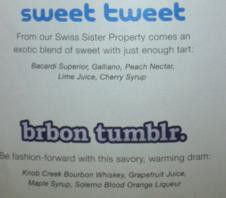
Oh no. “The Mandarin Oriental cocktail menu has social media cocktails.” I guess they can’t make a “LinkedIn Surprise” that consists of vomit and strands of hair.
Bee Vs. Moth: Live Session
by Awl Sponsors

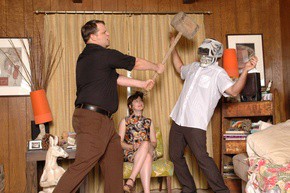
Tap into the best coverage of SXSW 2012, presented by MasterCard PayPass by visiting here. A sample:
The Oyster Princess, directed by the great silent-era pioneer Ernst Lubitsch, is the 1919 tale of the marriage of a spoiled millionaire’s daughter and a case of mistaken identity. It contains some of the most ridiculous images of obscene wealth and silly rich people ever committed to celluloid. It’s no wonder that the members of Austin’s avant garde quintet, Bee vs. Moth chose this film to re-score when the SXSW FIlm Festival commissioned them to perform a new work at the fest: In many ways it’s the perfect film for the new gilded age of 2012 and kudos to Bee vs. Moth for resurrecting and renewing this nearly 100-year-old classic for modern audiences.
Bee vs. Moth debuted their original score to The Oyster Princess at the 2012 SXSW festival with a live performance to accompany the film. The members of this eclectic ensemble are Sarah Norris (drums, percussion) Philip Moody (electric & upright bass), Aaryn Russell (guitar), Ivo Gruner (trumpet), and Thomas van der Brook (saxophone). Each of the members play in several other Austin bands as well as working together as Bee vs. Moth.
In the clip below, Austin’s Bee vs. Moth offer a taste of what makes them one of the standout groups in a city positively teaming with musicians. Additional performances of Bee vs. Moth’s original score for The Oyster Princess are scheduled for Dallas and Houston in the near future.
Bee Vs. Moth at SXSW from Largetail on Vimeo.
It's the Lowest Moment Yet for Michael Bloomberg
Oh, the constant see-sawing of Michael Bloomberg from hero to villain! Remember how we were loving him again just last month when he made that big old matching donation to Planned Parenthood? Well, a lot has changed in a month.
• The hand-holding visit to Goldman Sachs, followed by the trip to Shake Shack with Goldman co-CEO Lloyd Blankfein, in the wake of the resignation-by-op-ed of Greg Smith? That went over quite poorly. Dude: you already held their hand, in the form of tens of millions of dollars in concessions. Also, the City even gave them the address of 200 West Street, which should have been 201 West Street, just because they wanted it. How hard you wanna squeeze that sweaty hand?
• The City’s decision to prevent people from donating food to government-run homeless shelters and programs is going over extremely poorly. Which is reasonable, since that’s nanny-stateism gone amok.
• And what’s been pretty seriously under-covered is this past weekend’s amazing outburst of out-of-control NYPD tactics on Occupy Wall Street.
“If they get too close, just hit them,” is what a reporter heard cops tell each other at Saturday’s demonstration and march — right before cops broke a window with someone’s head.
73, or 76 people were arrested on Saturday. Three of them now have felony charges — including the time-honored “pushing an officer.”
And even before that, there was the bizarre arrest of Kira Moyer-Sims and two others, for unclear reasons, but as part of NYPD surveillance: “police officers or detectives have been posted outside buildings where private meetings were taking place, have visited the homes of organizers and have questioned protesters arrested on minor charges.” (And Mark Adams! “a 32-year-old engineer from Virginia, said he was arrested in November at an Occupy Wall Street protest in Midtown and was questioned by a police detective and an agent from the Federal Bureau of Investigation, who asked about his involvement with Occupy Wall Street, requested his e-mail address and inquired whether he had ever been to Yemen or met anyone connected to Al Qaeda.”)
Meanwhile, recent arrestees had their bail set based on whether they submitted to biometric scanning.
This is all a bad look for the mayor, at best — but it’s not actually about appearances. This is about him showing how he wants the City run.
Could be worse though! Never forget! New York City could be in Georgia.
Drinking Makes You Evil
Do bendy elbows turn you Republican? “Political conservatism rose with blood alcohol content. These studies show that conservatism may be tied to low effort vs deliberate thinking…” I feel so conflicted about this!
Adorable Canadian Scandal Appeals To The 10-Year-Old In All Of Us

WHOA, CANADA: “The so-called bust bus fiasco has sent Alberta’s election off to a bizarre start — how was it that those two wheels ended up right there, directly under the neckline of a female politician’s campaign bus photo? And was the reaction sexist? With a campaign expected to officially begin next Monday, the right-wing, libertarian Wildrose Party unveiled its campaign bus at Alberta’s legislature Monday. The bus is covered in a decal, or ‘wrap,’ with the Wildrose logo, website and a picture of its leader, Danielle Smith. But her head and shoulders are directly above the two back wheels, framing them.” [Photo via]
